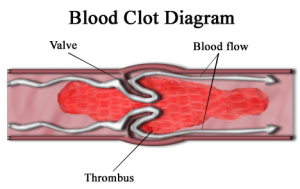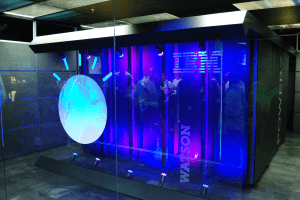Can Medical Errors be Prevented by Cognitive Computing?
 Does cognitive computing offer hope in preventing medical errors?
Does cognitive computing offer hope in preventing medical errors?
A 68-year-old man undergoes successful coronary artery bypass surgery. A week later, he develops pain and swelling in his right calf and returns to the hospital. Diagnosed with deep venous thrombosis (DVT), he receives dosages of heparin for someone half his weight. A few days into his hospital stay, his breaks and travels to his lungs, causing a fatal pulmonary embolism.
Venous thromboembolism is the most common preventable cause of hospital death today. What if, within minutes, we could correctly diagnose a DVT and calculate the correct anticoagulant dosage according to weight? Many deaths could be prevented.
Preventable Medical Errors Death Rates
Preventable medical errors are now the third leading cause of death in the U.S. More than 400,000 patients die annually due to problems associated with their hospital care, according to an article in the Journal of Patient Safety entitled, “A New, Evidence-based Estimate of Patient Harms Associated with Hospital Care”.
Misdiagnoses and incorrect treatments are prevalent not just in hospitals, but throughout our entire healthcare system. A study by the Rand Corporation 10 years ago found that U.S. physicians follow recommended best practices for diagnosis and treatment only about 55% of the time.
Cognitive Computing and Complexities of Treatment
Think about all the diagnostic challenges we face today. For example, a 22-year-old woman is diagnosed with breast cancer. There are 50 different types of breast cancer. Which is the most effective therapy in her case? Because of the particular mutation of her tumor cells, the cancer does not respond to the drug therapy typically prescribed. How much would the tumor advance while she is on a drug that is totally ineffective?
Can you imagine what our lives would be like if we could identify the best treatment option based on each individual patient’s genomic data, imaging data, past medical history, family history, allergies, and personal preferences? How does cogntive computing affect this? In other words, can cogntive computing help us find a needle in a haystack of information in almost no time? As things stand now, determining the most appropriate cancer treatment from among the 80 cancer therapies currently available and the additional 800 therapies being studied in clinical trials can be truly daunting.
We are now in the era of Big Data. Five thousand biomedical articles are published every month. As new evidence emerges and established guidelines are updated, how can healthcare professionals keep current with the best evidence? In view of our ever increasing emphasis on patient-centered care, how can we make the right decisions and do our best for each individual patient?

Sherlock Holmes
There is an exciting answer. Remember when Watson, the IBM computer, beat two of Jeopardy’s greatest champions in 2011? Since then, Watson has gone to medical school!
Who is Watson and Why Should You Care?
Watson has been working with physicians at Sloan Kettering Memorial Hospital, MD Anderson and the Cleveland Clinic. Oncologists at Sloan Kettering partnered with IBM’s computer experts and downloaded patient electronic medical records, including demographics, cancer type, genotype, plus all of the cancer treatment protocols, clinical guidelines, drug information, and new data from the latest published studies.
These oncologists are teaching Watson the best evidence in cancer treatment. Watson can understand natural language, read, analyze, learn, and relearn based on new information. Watson can synthesize all this information and merge it with the patient’s medical profile to arrive at the best possible choices in a full range of treatment options – all in a matter of minutes. Watson can also determine when more information or testing is needed in order to make better recommendations.
Watson is the most exciting platform of cognitive computing today. On January 9, 2014, IBM launched Watson Group, a new business venture. The company plans to invest more than one billion dollars in development and research to bring cloud-delivered cognitive applications and services to market.
 As a decision support tool and collaborator for cognitive computing with health professionals, Watson can help reduce the ever increasing medical errors we now have in the U.S. Watson can help us make the right decisions and teach us how to provide better and safer care.
As a decision support tool and collaborator for cognitive computing with health professionals, Watson can help reduce the ever increasing medical errors we now have in the U.S. Watson can help us make the right decisions and teach us how to provide better and safer care.
In addition to its usefulness in health care, Watson has applications in other industries too, such as banking and retail. In the future, Watson might even help people find jobs by matching their skills and attributes to suitable job openings. The possibilities are endless. Imagine Watson going to law school and nursing school!
Futurist Alvin Toffler got it right with his forecast, “The illiterate of the 21st century will not be those who cannot read and write, but those who cannot learn, unlearn, and relearn.”
Enter cognitive computing!
 Linda Husted, MPH, RN, CNLCP, LNCC, CCM, CDMS, CRC wrote this guest blog post. Watch the recording of the Falls Course in which Linda presents the best evidence concept related to life care planning. Check this link for details Falls Course.
Linda Husted, MPH, RN, CNLCP, LNCC, CCM, CDMS, CRC wrote this guest blog post. Watch the recording of the Falls Course in which Linda presents the best evidence concept related to life care planning. Check this link for details Falls Course.
